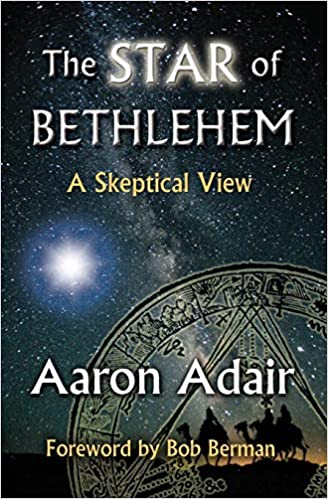
I have replied to atheist physicist Aaron Adair once already: Star of Bethlehem: Reply to Obnoxious Atheist Aaron Adair (Plus Further Related Exchanges with Aaron and a Few Others in an Atheist Combox) [1-14-21] He has come back with a new hit-piece: “Who do you say I am?” Bad Commentary Research on the SoB [1-18-21], which was a “reply” to my post, Bible Commentaries & Matthew 2:9 (Star of Bethlehem) [1-13-21].
What follows is my counter-response, which was also posted underneath his article in the Tippling Philosopher forum. No doubt it’ll lead to another “feeding frenzy” of atheists insults. Let ’em fly! I engage in serious discourse. not excrement-throwing contests. Aaron’s words will be in blue.
*****
Dave proves that he is not an honest researcher, but the worst form of apologist, including hiding relevant information and even straight-up knowingly lying. I don’t like to make this latter accusation, but it is provably so, as I will demonstrate. . . .
Now, he’s taken this tactic to the level, dishonest level. . . .
Mr. Armstrong is imposing a lot onto this commentary and ignoring virtually everything else. Obviously because it doesn’t fit what he wants. So this is both a lie of omission and a lie of saying something is there which is not.
. . . he is lying. He knows this isn’t true, but says it anyways. That makes him a lying liar.
Now, let’s take stock of all of this. Does Dave’s failure to honestly present information . . .
He doesn’t know the facts, and he cannot honestly represent the data.
This is even more ridiculous and fact-challenged than Arrogant Aaron’s last hit-piece (and that was an awfully low bar itself). It deserves no reply at all, excepting just one thing:
Can you see a pattern yet? Dave continuously avoids showing what else these commentaries say. That is a classic quote mine, and it is a disingenuous method of citation. It actively hides what the quoter doesn’t want you to know. However, so far, these are lies of omission.
Absolute lie: and this is the bulk of his pseudo-“argumentation.” He simply repeats the same falsehood over and over. I made it very clear in my paper citing many commentaries:
For the sake of brevity, I only cite them where they agree with me or when they claim not to know what it was (neutral or agnostic position: II and IV below). I’m not denying at all that these commentators may also disagree on the other major point or additional ones. Readers who want to see their entire comment on Matthew 2:9 can follow the links I provide.
This wasn’t added “after the fact” in the face of Aaron’s tortured logic and cynicism as to my honesty and competence. It was there from the beginning.
Aaron for some reason that I cannot fathom, seems to be unable to comprehend the notion of citing someone where they agree, whereas the same person cited may very well disagree on other things. It’s not automatically dishonest citation. Aaron hopes and wishes that it is so in my case, so he can mock and dismiss my overall case, but it simply isn’t: try as he may to make it so.
Citation of this sort (i.e., in partial agreement) happens all the time in apologetics and theology. To give one example of hundreds: Martin Luther agrees with Catholics (over against someone like Zwingli in his time and Baptists in ours) that in the Eucharist is Jesus’ Real Presence. But he disagrees with our doctrine of transubstantiation and also of the sacrifice of the Mass. This is all made very clear in my writings. I wrote one book very critical of him overall (while still noting agreements) and then edited another consisting of all writings of Luther’s that Catholics would agree with. This is not dishonest or “lying” at all. It’s an exercise in seeking to find as much unity as possible.
I even entitled the book, The “Catholic” Luther. Now, once Aaron sees that, with his ludicrous methodology, he’ll say, “See! Dave is such a liar and incompetent buffoon that he thinks Martin Luther is a Catholic!” He would likely miss the quotation marks, which change the meaning entirely. In my seven-page introduction I explain myself very carefully, so there is no doubt. And it is the same sort of approach that I took in this paper about Bible commentators and the star of Bethlehem:
I have been very critical of Luther’s theology, where one would except a Catholic apologist to be, but I’ve also always sought to give him credit where it is due, to defend him against bum raps, and to note as much agreement between Luther and Catholics as it is possible to do. . . .
I can already foresee one of the criticisms that will inevitably be made against this book: “you have quoted him out of context! If you read the next paragraph, you’ll see something very different . . .”, etc., etc. . . .
I’m simply citing the portions of Luther’s writings that a Catholic would agree with. Often it will be a partial agreement, later nuanced and qualified by Luther, and sometimes contradicted by Luther, as his thought is not always necessarily logically consistent or coherent. . . .
Every work of systematic theology does the same thing: citing short portions of Scripture to establish a common theme of one strand of theology. It’s impossible to provide two pages of context for each passage. That’s not the purpose of it. . . .
I cite portions of his writing that particularly appeal to Catholics, since we fully agree with them, with the understanding that Luther and Catholics don’t agree on every jot and tittle. This is not quoting “out of context.” It’s partial quotation of one truth that Luther asserts, while not necessarily always noting (as is impossible to do in a quotations book) other truths that he places alongside these. The two things are different.
The present Introduction is, therefore, supremely important for readers to grasp exactly what I am trying to accomplish and what I am asserting about Luther and his theological positions: to be interpreted within the parameters and assumed qualifications here surveyed.
The ecumenical endeavor is devoted to finding things that Christians have in common. This book will do exactly that. My aim is not to exaggerate or distort anything in Luther, in order to make out that it is something it is not, or that he is different than he was.
Ironically, I’ll likely receive heavy criticism from several directions. Some Catholics (especially those who consider themselves more “traditional” on the spectrum) will think I am whitewashing Luther and giving the public a “cleaned-up” version who appears so Catholic that they will think there is scarcely any difference between the two theological camps. They’ll object to that as dishonest and compromised.
Some Lutherans, on the other hand, may object insofar as they might think I have deliberately concealed Luther’s “Lutheran distinctives” in order to make him palatable to Catholics. And this will offend them. They’ll say that I’m not presenting him as he was, and not in context.
This is, of course, an extended analogy, and Arrogant Aaron has shown that he doesn’t comprehend those, either, since every analogical argument I have made in my many papers on the star has been utterly ignored by him as supposedly “irrelevant” or off-topic.
Be that as it may, it remains a perfectly legitimate form of argumentation. And this material from my book of Luther “Catholic” quotations illustrates exactly how Aaron is dead-wrong in his current critique, just as he was in his last one. He’s simply engaging in sophistry and trying to make out that I am an inveterate liar. I don’t say he is that, because I don’t play his game. But I do say that he is lying about me over and over and speaking falsehood about me.
I have explained exactly how he is doing that in the above piece of trash.
***
Aaron replied underneath his paper:
You can’t honestly quote several sources together, categorize them as “I. Star of Bethlehem Was a Natural Celestial Phenomenon”, and yet not a single one thought the Star was natural. Not. One. That makes you a liar. Clearly so to any literate person.
[Y]ou ignore what the commentaries are explicit and unambiguous about: the Star was supernatural. They said so. In every. Single. Commentary you cite.
I summarized what the sections regarding “natural” or “supernatural” showed about the views of commentators:
Summary:
A comet or a supernova or a conjunction are “natural phenomen[a]” according to Michael J. Wilkins, who says that “many” commentators have taken one of these views.
Philip Schaff and Robert H. Mounce think it was a conjunction (my own view).
Coffman Commentaries says “we may not know the exact nature of that star” (thus it allows for the possibility of a natural explanation).
D. A. Carson says that “supernatural [view] is possible” which clearly means that a natural view may have been the case.
All this and you come up with your alt-reality nonsense. It’s bizarre. You deny the obvious reality of what you are reading. I think it’s explained simply by extreme hostility. That does odd things to a mind (even an otherwise brilliant one) and causes it to spew out the most ridiculous interpretations.
***
Photo credit: cover of 2013 book by Aaron Adair, from its Amazon page.
***













